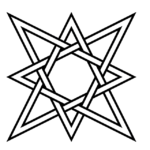“Prayer indeed is good, but while calling on the gods a man should himself lend a hand.”
– Hippocrates
 Almeri is a world filled with divine energy, although whether mere mortals can tap into that energy is the subject of some debate. There are places that overflow with it like volcanic caldera or windswept mountaintops, but it is commonly thought that the divine flows the natural world and provides the spark for independent thoughts. And while many areas have their own civic gods or even powers that claim dominion over wider areas, it is generally considered that the Pentarchy are the major deities.
Almeri is a world filled with divine energy, although whether mere mortals can tap into that energy is the subject of some debate. There are places that overflow with it like volcanic caldera or windswept mountaintops, but it is commonly thought that the divine flows the natural world and provides the spark for independent thoughts. And while many areas have their own civic gods or even powers that claim dominion over wider areas, it is generally considered that the Pentarchy are the major deities.
These five gods do not claim to have created the world, and may just be the last of the Makers. Neither do they claim true relation to one another, perhaps it is only their great power and competition with one another that make them a grouping at all.
While individual priests will swear by a single patron, most folk look to each god in need, depending on circumstance. Certain gods hold more sway in certain locations — Akilo is the patron of the Venitine empire, for example — but each are acknowledged as power beyond any mortal ken. Many priests of the Pentarchy do have magical powers, and claim they are but vessels of divine will, but these powers do not vary greatly from those who study mystic symbols or truck with demons.
Each of the Pentarchy have their temples, and they are rarely worshiped together. Crossroads often marked with polished stones that passers-by will lay their hands on reverence, and the superstitious will cover their hearts with an open hand to invoke their blessing over ill omens, but their are no services held in their collective honor.
They are seen as personifications of desires and attributes, and their worshipers often emulated these traits, but this should not be taken to mean that teach moral values. They are mighty forces that need to be glorified or appeased, and their faithful follow their strictures, but they rarely provide any true philosophy or path to salvation. They themselves are often fickle, and legends abound of them acting pretty, vindictive, and often cruelly to mortals.
The Gods of the Pentarchy
 Zula. The deity revered most widely among the common folk is Zula. She is a goddess of family, strength, and protection personified by a mother bear. Sacrifices are made to her to ensure plentiful harvests, fruitful marriages, and harmonious gatherings. Even the smallest villages will have shrines to Zula. Many members of her priesthood do good works and share the practical wisdom of the hearth and field between communities. Her martial order is the backbone of country militias and border garrisons.
Zula. The deity revered most widely among the common folk is Zula. She is a goddess of family, strength, and protection personified by a mother bear. Sacrifices are made to her to ensure plentiful harvests, fruitful marriages, and harmonious gatherings. Even the smallest villages will have shrines to Zula. Many members of her priesthood do good works and share the practical wisdom of the hearth and field between communities. Her martial order is the backbone of country militias and border garrisons.
Zula is tied to the Earth, and her holy objects are crafted of stone and clay. Her vestments are of leather and fur, and her symbol is a stylized bear claw. Success is a sign of favor from Zula, and her adherents may flaunt their wealth or offer generous gifts. The chosen weapon of her martial adherents is the mace.
 Akilo. Is important largely because his worship is the state religion of the Venetian Empire. Akilo is known as a god of justice, virtue, and glory, and his priesthood reflects that with pomp and ritual. His aspect is the eagle, and temples feature soaring colonnades and domes — often open to the sky above. Shrines to the god can be found in many places in the wild.
Akilo. Is important largely because his worship is the state religion of the Venetian Empire. Akilo is known as a god of justice, virtue, and glory, and his priesthood reflects that with pomp and ritual. His aspect is the eagle, and temples feature soaring colonnades and domes — often open to the sky above. Shrines to the god can be found in many places in the wild.
The priests of Akilo often do double-duty as judges, and his martial orders hunt down and punish criminals. The ‘justice’ of Akilo is relative, as it often serves the needs of the Empire more than any abstract ideal. The Emperor is said to speak with the force of the god, and his will is seen as divine scripture. This can lead the church into maintaining a difficult balance between the ideals of Akilo and the orders of his earthly servant.
Akilo is bonded with the air, and the raiment of his clergy are often decked with feathers and flowing blue robes. Offerings are made of incense and other costly materials burned and sent up to his mountaintop demesne. The sacred weapon and symbol of office is the spear.
 Muranae. The most clever of the gods is often as seen as the least of them. His aspect is the field mouse and he personifies cleverness, industry, and perseverance. It is often said that he was the one who first taught man dominion over the beasts and skill with tools. His legends often feature him siding with mortals over the other gods, or tricking them to achieve his goals.
Muranae. The most clever of the gods is often as seen as the least of them. His aspect is the field mouse and he personifies cleverness, industry, and perseverance. It is often said that he was the one who first taught man dominion over the beasts and skill with tools. His legends often feature him siding with mortals over the other gods, or tricking them to achieve his goals.
He is often invoked at the beginning of endeavors and is supplicated by small offerings of food or objects of value. If a creature is found to be taking such a sacrifice, harming it is the worst form of bad omens. HIs is a religion of protecting the weak against the strong, and the concept of mice being crushed in the claws of an eagle is not lost on them.
His priesthood are often itinerant wanderers or cloistered groups. He is tied to fire and his sacred weapon is the bow. Servants favor earth tones and soft fabrics and eschew obvious symbols of wealth.
 Khark. The bloody god is more feared than revered among most mortal creatures, but few who travel upon his waters do so without trying to appease his wrath. His aspect is the shark and his will is embodied by both the waves and the storms of the sea. Many consider all ill fate as caused by Khark.
Khark. The bloody god is more feared than revered among most mortal creatures, but few who travel upon his waters do so without trying to appease his wrath. His aspect is the shark and his will is embodied by both the waves and the storms of the sea. Many consider all ill fate as caused by Khark.
Shrines to Khark can be found at most city gates and port entrances, and usual sacrifices are animals or blood. His silent priests accept offerings of wealth to perform secret rituals to cast the god’s eyes away from petitioners. He is tied to water and his worshipers favor dark grey and deep ocean blue. HIs token is the sword.
 Areope. She is an outsider even among the gods. Areope is the goddess of death and fate, and it is said that she even knows when the gods are doomed to die. But through it all she watches and weaves and ensures that the inevitable happens. Only Areope knows what is beyond the veil of death. Legends speak of a time the Muranae plied her with wine and lured her to sleep to peak beyond, but if he did he has told no one what is to be seen.
Areope. She is an outsider even among the gods. Areope is the goddess of death and fate, and it is said that she even knows when the gods are doomed to die. But through it all she watches and weaves and ensures that the inevitable happens. Only Areope knows what is beyond the veil of death. Legends speak of a time the Muranae plied her with wine and lured her to sleep to peak beyond, but if he did he has told no one what is to be seen.
Her knowledge and detachment has made her a patron many kinds of misfortune, like disease and decrepitude. Children born with obvious deformities are said to be chosen by her, and are often raised in the church. Where Akilo is the lord of Justice, Areope is the patron of law. Many official legal documents are sealed with symbolic eight-pointed star.
Areope’s aspect is the spider, and she is tied to the spirit. The dead are presented to her in her temples, and most communities of even moderate size have a temple for this purpose. After a full night-and-day vigil, the body is removed and is burned, buried, or cast off to sea by local custom. Bodies not brought to her to fate their fate sealed may be doomed to roam the world after death.
Her priesthood (and her children) wear naught but black. Higher orders wear capes of silver links in the shape of webbing. Her symbol of office is the staff.
Priestly Magic
There are wizards in the service of all the gods, and cultists and prophets of many more. In practice, their magic differs little from the hedge wizards or thaumaturges of the secular. They may claim (and may even be correct) that they get their powers from some conduit to the gods, but the casting of spells is still taking on their spirit. Their grimoires may be holy books, but still require words and gestures to channel magical power. And while a priestess of Zula may cure a peasant of a medicament or a monastic brother of Muranae might repair a miller’s wheel, the miracle-working healers of legend are not common in Almeri
New Talent Use (Priest): Divine Inspiration
A spell-casting figure with the Priest talent can perform a ritual of at least one minute to give them additional strength to perform a task. A successful 3/IQ test will give the Priest 2 mana to be used on a task in the near future. This is above any other source of mana and dissipates within five minutes if not used. A Theologian can gain 4 mana with a similar ritual. If the priest prays for inspiration more than once per day, the test is made with an additional die, so the second attempt would 4/IQ ands a third would be 5/IQ.
To perform the ritual, the priest must have their holy symbol and a sacrificial offering appropriate to the god. A Theologian can gain 1 mana even without their symbol or a sacrifice. At the GMs discretion, the priest might forgo the mana and gain a small bit of advice or inspiration from the gods.
